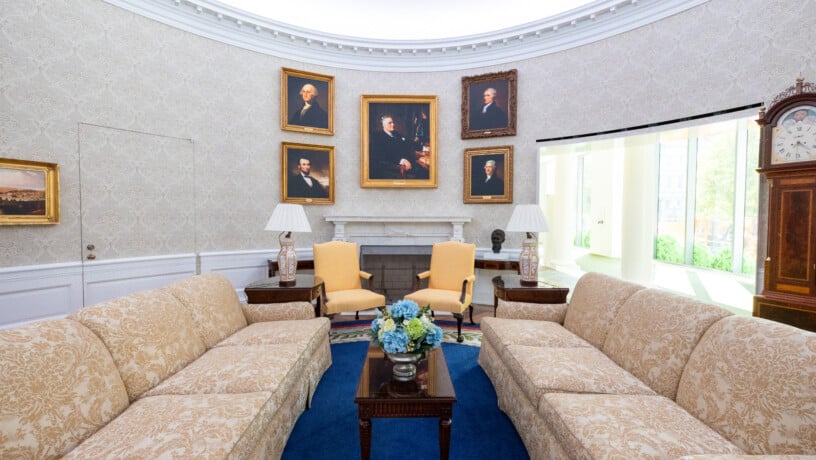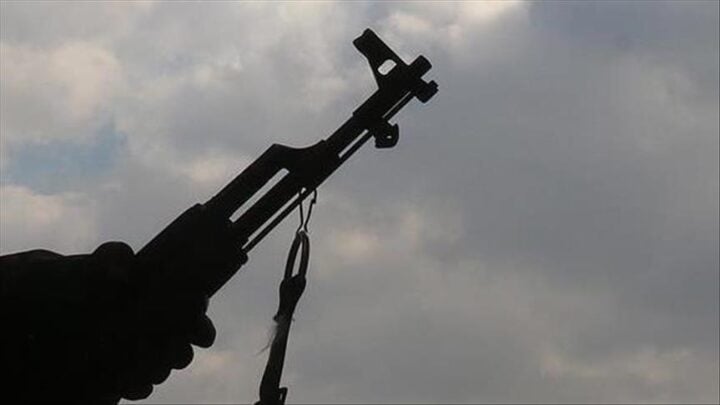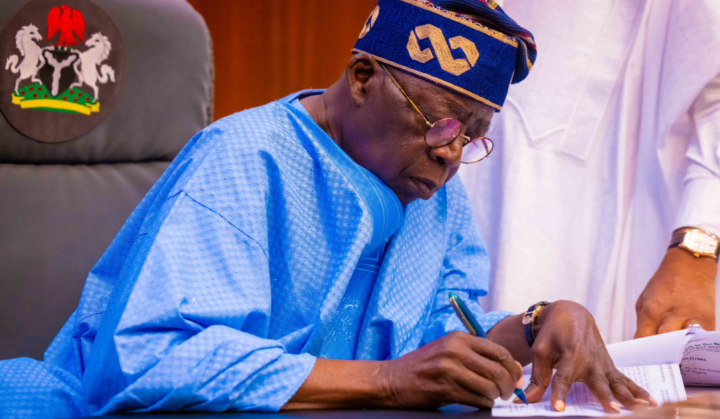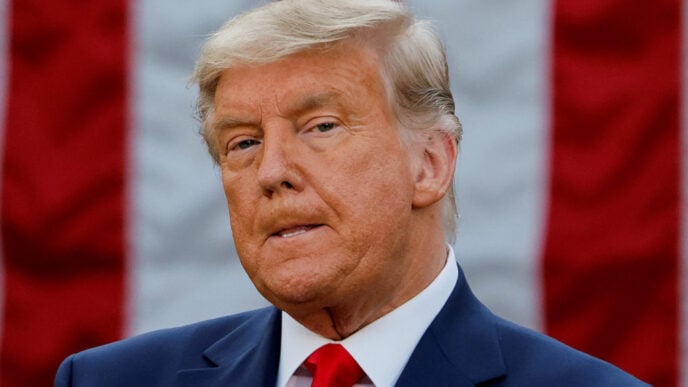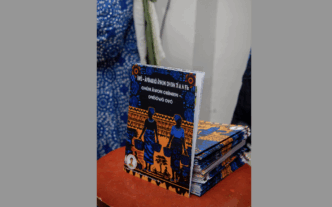The Oval Office
When the news broke at the weekend that President Trump is considering a military action against terrorists whom the United States government has accused of carrying out ‘genocide’ against the Christian population–an allegation the Nigerian government has repeatedly denied–it sent shockwaves across the country. The announcement of a potential US military action on terror in Nigeria has dominated national discourse and left many Nigerians in different states of emotions depending on which side of the divide they find themselves.
And the whole saga seems to have unravelled in quick succession.
After weeks of intense and sustained lobbying by the US Republican senators spearheaded by Ted Cruz and the endorsement of the US Congress, President Trump again designated Nigeria (for a record second time) as a Country of Particular Concern (CPC). In a statement posted on his (in)famous Truth Social account, Trump’s message was blunt and terse, devoid of all diplomatic niceties. He wrote: “Christianity is facing an existential threat in Nigeria. Thousands of Christians are being killed. Radical Islamists are responsible for this mass slaughter. I am hereby making Nigeria a ‘COUNTRY OF PARTICULAR CONCERN’. But that is the least of it. When Christians, or any such group, is slaughtered like is happening in Nigeria … something must be done! … The United States cannot stand by while such atrocities are happening in Nigeria, and numerous other Countries. We stand ready, willing, and able to save our Great Christian population around the World!”
The Nigerian government has, however, doubled down on its position. In a flurry of messages, Tinubu’s administration insisted there was no Christian genocide in Nigeria. In a message, the President reiterated that “religious freedom and tolerance have been a core tenet of our collective identity and shall always remain so”. He maintained that both the Muslim and Christian populations are targeted by extremists.
Advertisement
Yet, within hours of Trump threatening military action, there was a notable shift in tone from the Presidency. Daniel Bwala, the special adviser to the president on policy communication, issued a statement via his official X handle that Tinubu and Trump would meet in the coming days–either at Nigeria’s State House or the White House– to ‘sort out the differences’ arising from the crisis. Bwala’s carefully worded statement marked a clear departure from the combative stance taken by other administration officials and the plethora of self-appointed or sponsored spokespersons purportedly speaking on behalf of the government.
Since President Tinubu assumed office on May 29 2023, the Nigerian president has yet to meet the US president either privately or in an official capacity. Analysts have interpreted this as a sign of strained relations worsened by Nigeria’s refusal to accept Venezuelan refugees to be deported to the country. There have also been several explanations advanced for the cold shoulder by Washington. It is interesting to note that during Trump’s first term, he designated Nigeria as a country of particular concern–a label that Joe Biden removed. Many observers believe that Trump still views Nigeria through the lens of his first term as president- a country he believes is incapable of protecting its Christian population.
However, Bwala’s confirmation of a possible Trump-Tinubu summit presents a welcome diplomatic opportunity under what circumstances? These are not the best of times in the US-Nigeria relationship. Historically, both nations have had economic, diplomatic and bilateral relations. A meeting between the two leaders could be an opportunity to engage in diplomatic and bilateral discussions that would benefit Nigeria and the sub-region, given the insecurity that is currently ravaging the country. A summit could provide a forum to repair strained relations and strengthen diplomatic ties, especially in combating terrorism and insecurity facing the Middle Belt and the north.
Advertisement
Yet, any meeting with Trump has its challenges. Visiting the White House during the Trump presidency has often resembled walking into a lion’s den. Trump’s unpredictable temperament and the aggressive posture of his aides, such as Vice President JD Vance and Rubio, the secretary of state, or Defence Secretary Hegseth, have rattled seasoned leaders. Two previous meetings between Trump, South African President Cyril Ramaphosa and the Ukrainian President Zelensky are pointers to how Tinubu’s proposed meeting could unfold.
On May 21, President Ramaphosa visited the White House for a high-stakes working visit aimed at resetting and revitalising bilateral relations between South Africa and the United States. Though the reason for the visit was couched in official diplomatic language, both countries had been engaging in a war of words with the Trump team accusing the South African-led ANC government of engaging in genocide against the South African White population.
During the meeting, Trump presented a newspaper print-out and a video “evidence” of alleged White genocide in South Africa. But in the widely televised meeting, Ramaphosa was praised for being calm in a tense Oval Office. He dismantled the conspiracy theories and disinformation, and allegations of White genocide. He never interrupted Trump but presented facts to counter the widely held narrative. The Ramaphosa Rainbow team in the Oval Office also lent credibility to his defence. The South African president was widely known for his restraint and turning what could have been a dressing down into a moment of statesmanship.
Zelensky, by contrast, endured a disastrous meeting. His talk with Trump collapsed in acrimony. No deal was signed as the Oval Office engagement ended abruptly. Tinubu must avoid the ‘Zelensky scenario’ and aim instead for ‘Ramaphosa outcome’. To do so, he must attend the meeting with verifiable data and readiness to acknowledge Nigeria’s security shortcomings and an appeal for Trump’s appreciation of Nigeria’s religious complexities. His team going to the White House must consist of a broad mixture of respected Nigerians across religious and ethnic divides who understand religious and Nigeria’s ethnic relations just like Ramaphosa’s delegation. This is not a battle of egos. Belligerence or defensiveness will only deepen mistrust. Tinubu’s administration rhetoric in the lead-up to the talk should be guided and focused on diplomacy and cooperation, not name-calling and propaganda.
Advertisement
Trump is declaring possible military action against terrorists and bandits–not the Nigerian State. If the Nigerian government truly desires to end these killings, cooperation with international partners should be seen as an opportunity, not a threat. What the United States and the world want to see is Nigeria’s commitment, sincerity to end the killings, not complicity and lack of political will to bring perpetrators to justice.
For years, massacres in Benue, Southern Kaduna and Plateau have largely gone unchecked, with entire villages wiped out in midnight raids. The victims, overwhelmingly from Christian communities, have borne the brunt of the violence. Yet it must also be acknowledged that terrorism has affected all Nigerians, including the Muslim population. Recognising the dual reality and presenting the arguments and facts with sincerity is the first step to resolving this conundrum. Our country is at a crossroads; a Tinubu-Trump meeting will either exacerbate the crisis or defuse it. To ensure the latter, the leadership must show the political will to safeguard religious freedom, end the killings and unmask state and non-state actors behind the killings
Views expressed by contributors are strictly personal and not of TheCable.

